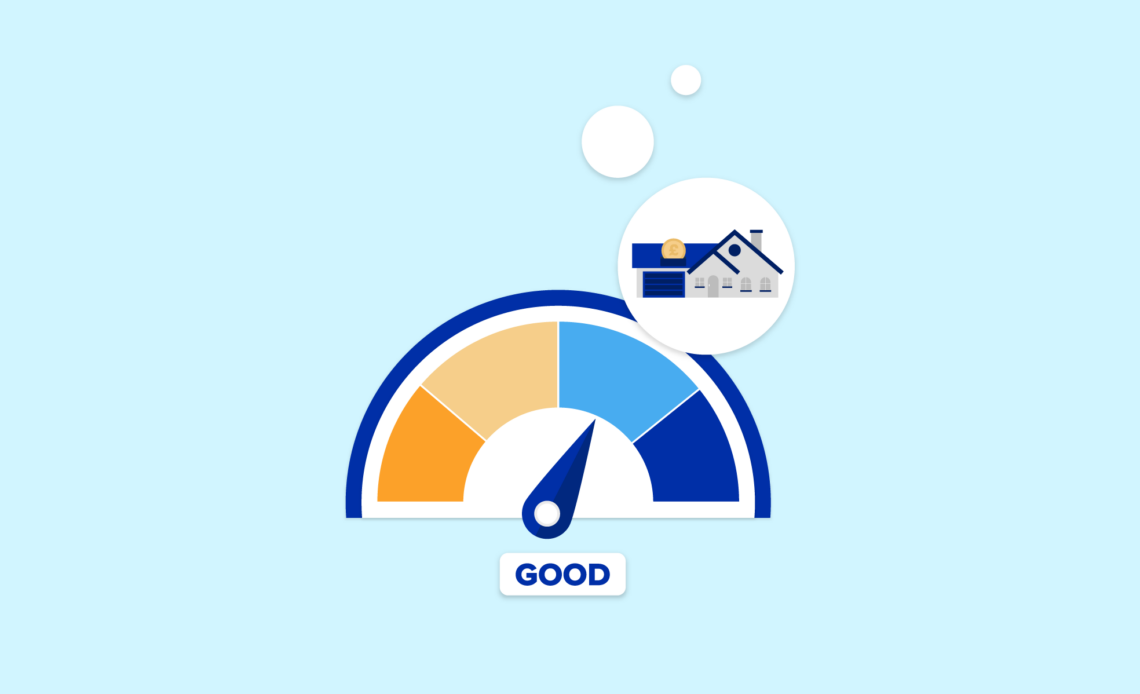
When you apply for a mortgage loan, lenders will look at your credit history.
In order to be accepted, you need to show mortgage brokers that you have a history of paying off debt and can make your mortgage payments in a timely and reliable manner.
Mortgage lenders look at all kinds of factors to determine if you are eligible for a loan and what the terms of that loan will be.
When you apply for a loan, one thing they work out is your credit score and credit history. Your credit score is like a measure of financial trustworthiness and lenders will look at your score to see if you can handle a loan.
But you might be wondering: What credit score do I need to have to buy a house?
We will answer that question and many more in this article.
What Credit Score is Required?
Simply put, there is no minimum credit score you need to secure a mortgage or buy a house in the UK.
This is because, in the UK, there isn’t just one single credit score. When lenders look at your mortgage application, they will calculate a credit history score for you, and this score can differ from lender to lender.
Unlike in the US, which has a singular credit score that lenders will pull, leaders in the UK use their own metrics to determine a credit score for you.
However, most lenders may have a minimum score that you need to have to get a loan. Every lender has different rules on what they consider a low or bad credit score, and your credit score is not the only thing that determines if you can get a loan.
Most lenders will approve a mortgage application if your score falls in their designation of “excellent” or “fair.” Alternatively, if your score is “poor” or “very poor” then you will have a much more difficult time securing a home loan.
Each mortgage broker will use their own scoring metrics, but most of the time they pull basic credit report data from one of three credit reference agencies: Experian, Equifax, and TransUnion.
The scoring values for these agencies are as follows:
- Experian: 0-999
- Equifax: 0-700
- TransUnion: 0-710
Depending on where you fall within these score ranges, your score will be marked as either very poor, poor, fair, good, or excellent.
In general, you want your score to fall in the ranges of “good” or “excellent” to have the best chance of securing a home loan with decent terms.

How Does Your Credit Score Affect Your Mortgage Agreement?
Your credit score is just one of many factors that will affect your mortgage agreement. It is certainly one of the most important factors, but it is not the only one. Other factors that lending institutions consider include:
- Debt-to-asset ratio
- Savings
- Deposit size
Aside from determining whether you get approved for your loan, your credit score also works to determine your interest rates and repayment terms.
If you have a low credit score, the lenders might judge your profile as riskier and you could get a higher interest rate. So for example, if you have a TransUnion score of 550, then you most likely will get a higher interest rate than someone with a score of 700.
What Is the Lowest Score I Can Have and Still be Eligible?
If your score is in the “poor” or “very poor” region, then you will have a challenging time securing a home loan without a cosigner that has a higher credit score.
While it is not impossible, those with a “poor” or “very poor” credit score are unlikely to be approved for a home loan. If you are approved, then they likely will have a very unfavourable interest and repayment terms.
If your score is low, then you will probably have to work on improving your rating before you can secure a loan.
What Score Can Secure a Decent Loan?
As we said earlier, creditors do not use universal credit scores so your exact chances of getting a loan will differ depending on the specific agency you use.
That being said, here is how a range of scores can affect your mortgage terms. This is a general guide and is based on Experian’s method of scoring individuals.
- Excellent: 961-99 – With an excellent score you will be in line for the lowest interest rates and the best mortgage repayment terms
- Good: 881-960 – A good credit score will secure a decent mortgage rate but not the best deals.
- Fair: 721-880 – A fair score will next you a decent mortgage with reasonable interest rates
- Poor: 561-720 – With a poor score, you can still get a mortgage deal but you will most likely have to pay very high-interest rates.
- Very Poor: 0-560 – If you have a very poor score you probably won’t be able to secure a mortgage at all and if you can, it will have extremely high-interest rates.
Keep in mind that even if you have a good credit score, your mortgage application could be denied based on other reasons such as your total debt-to-asset ratio or other factors.
Credit score is just one thing that lenders look at. Similarly, it is still possible that you get a mortgage deal even if you have bad credit but your other financial metrics look good.
How Does My Credit Score Affect My Deposit?
If your credit score does not meet a lender’s criteria for “good” or “excellent,” then you will have to put down a higher percentage of the market value of the property for an initial deposit.
The exact deposit you will be required to put down depends on your age, income, and the kind of property that you want to buy.
In general, there is no universal required deposit. But if you have a lower score, you may be required to put up to 30% of the initial deposit compared to just 10% if you have a higher score.
If a large deposit is not a viable option for you then you should consider improving your credit score before applying for a mortgage.

How Can I Check My Credit Score?
All credit reporting agencies in the UK are statutorily obligated to give you a copy of your credit report for free.
You can access your credit report online at their respective websites or you can request a physical copy be mailed to you.
It is usually worth getting a copy of your credit report from all three major agencies so you can compare and contrast scores.
Knowing how you score from the different agencies will give you a better idea of how your credit score will be interpreted by a lending institution.
Even if you are not about to apply for a loan or new credit cards, it is a good idea to check your credit file on a regular basis.
Credit scores usually update once per month and you can check as much as you want without affecting your score.
Only when a lending institution or credit card company pulls your credit file will it leave a mark on your record.
How Can You Boost Your Credit Score?
If you have a less than stellar credit score then there are some steps you can take to improve your credit score.
- Lower your credit utilization rate. A large part of your score depends on how much of your total credit cards balance you are using. Reducing this ratio will improve your score.
- Don’t apply for a lot of cards. Whenever you apply for some type of credit, the agency will perform a hard inquiry credit check which can lower your score. If you are trying to improve your score, hold off on applying for any new credit options.
- Make your payments on time. The single most important aspect that determines your credit score is your payment history. Make sure you keep up repayments on time and try to cut extraneous expenses if you are having trouble making payments.
- Save up for a large down payment. If you can’t raise your score quickly enough, try to save up so you can put down a large down payment. The bigger the down payment, the less time you will have to take to pay off the house and the less interest you will have to pay.
- Call a credit repair agency. If you have serious credit issues, then you might want to consider calling professional financial services to help you improve your credit score.
Conclusions
To sum up, there is no universal minimum credit score you need to meet for buying a house.
It is entirely possible to secure mortgage products even if your credit is not amazing. However, the better your credit is, the more favourable your loan terms will be.
Make sure to keep a consistent eye on your score and check it regularly so you can improve your chances of getting a mortgage with the best terms possible.
- The 9 Best UK Money Management Apps (2025) – for individuals and couples - August 8, 2024
- What Salary Should You Be Making At Your Age? (UK Guide) - August 8, 2024
- The Top 10 Most Ethical Banks in the UK: A Comprehensive Review for 2025 - August 8, 2024
